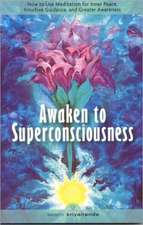Money Magnetism
Autor J. Donald Waltersen Limba Engleză Paperback – 17 iun 2004
According to J. Donald Walters, anyone can attract wealth..."there need be no limits to the flow of your abundance." Through numerous stories and examples from his own life and others', Walters vividly-sometimes humorously-shows you how and why the principles of money magnetism work, and how you can immediately start applying them in your own life.
"A thoughtful, spiritual guide to financial and personal prosperity. This book has timeless wisdom and practical solutions." -Maria Nemeth, author of The Energy of Money
Preț: 95.72 lei
Nou
Puncte Express: 144
Preț estimativ în valută:
18.32€ • 19.19$ • 15.18£
18.32€ • 19.19$ • 15.18£
Carte tipărită la comandă
Livrare economică 08-22 aprilie
Preluare comenzi: 021 569.72.76
Specificații
ISBN-13: 9781565891418
ISBN-10: 1565891414
Pagini: 180
Dimensiuni: 127 x 178 x 11 mm
Greutate: 0.18 kg
Ediția:tradepaper
Editura: CRYSTAL CLARITY PUBLISHERS
ISBN-10: 1565891414
Pagini: 180
Dimensiuni: 127 x 178 x 11 mm
Greutate: 0.18 kg
Ediția:tradepaper
Editura: CRYSTAL CLARITY PUBLISHERS
Notă biografică
In 1972 a fortuitous confluence of events made it possible to revive Yogananda's educational ideals. J. Donald Walters, a close American student of Yogananda's, had founded Ananda, the first World Brotherhood Colony, along the lines suggested by Yogananda. The families that gathered there were eager to provide their children with a school based on the principles from Ranchi. In 1917 the model for future Education for Life schools was founded in Ranchi, India, by Paramhansa Yogananda Paramhansa Yogananda, the author of Autobiography of a Yogi. He described some of his ideas in several documents, along with chapter 27 of his autobiography. In 1986 Mr. Walters published a major work, Education for Life, a book which describes the principles that Yogananda developed in language that is attuned to the modern Western audience. The book was launched at a weekend program at Ananda Village, attended by over 150 people. Walters emphasized that the principles described in the book are non-sectarian and could be broadly applied.

